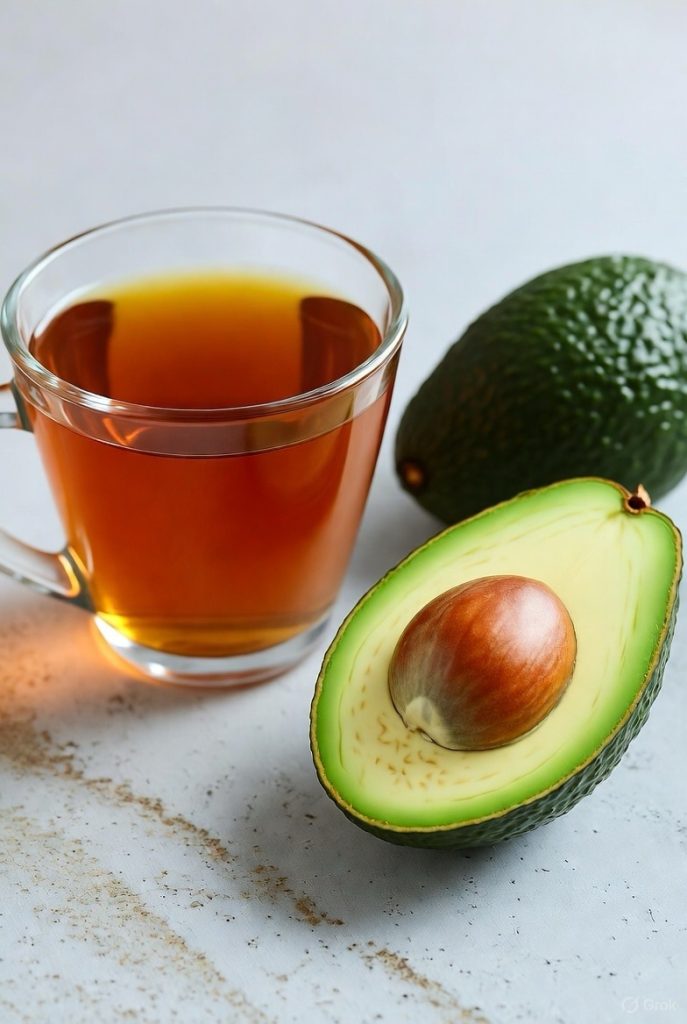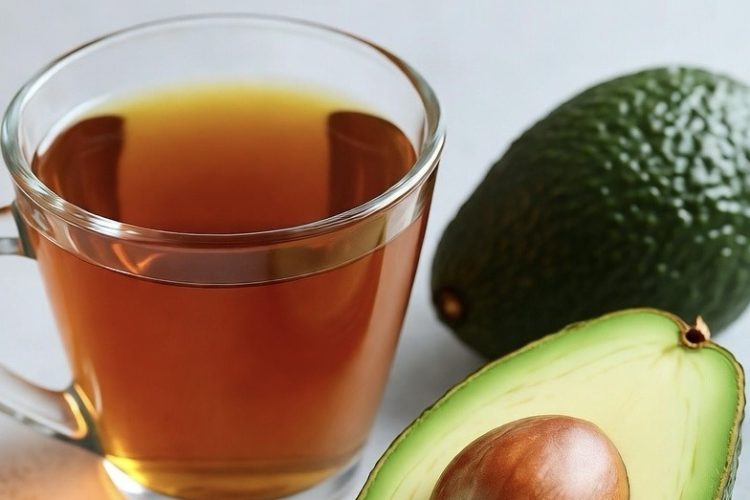Avocado seed tea, made from the pit of Persea americana, offers powerful health benefits rooted in Mesoamerican folk medicine. Rich in fiber, polyphenols, flavonoids, and tannins, it provides strong antioxidant and anti-inflammatory effects, helping reduce oxidative stress and ease inflammation. It supports heart health by lowering LDL cholesterol and improving circulation, aids digestion with soluble fiber to relieve constipation and bloating, and boosts immunity with antibacterial, antifungal, and antiviral properties. The tea may enhance metabolism, support weight management, and show early promise in anti-aging and anticancer effects. To prepare: wash, dry, grind the seed, simmer 1 tsp powder in water for 10–15 minutes, then strain. Use organic seeds and start small to avoid side effects like digestive upset or interactions with blood thinners. Beyond drinking, seed extracts are used in food preservation, cosmetics, and sustainable products, turning waste into value.
Long Version
Unlocking the Power of Avocado Seed Tea: A Comprehensive Guide to Its Benefits and Uses
Avocado seed tea, derived from the often-discarded pit of the Persea americana fruit, has emerged as an intriguing herbal tea option rooted in folk medicine traditions. In Mesoamerican remedies, indigenous cultures have long utilized avocado seeds for treating ailments like digestive issues, inflammation, and even hypertension, viewing them as a natural source of healing compounds. Today, this humble seed is gaining attention for its potential health benefits, thanks to its rich profile of bioactive phytochemicals. As we explore this fiber-rich resource, we’ll delve into its nutrition, preparation, and evidence-based advantages, while also addressing safety and broader applications.
Nutritional Profile of Avocado Seeds
At the core of avocado seed tea’s appeal lies its impressive nutritional composition. Avocado seeds are packed with polysaccharides, proteins, lipids, vitamins, and minerals, making them a nutrient-dense addition to any diet. They are particularly fiber-rich, offering soluble fiber that supports overall health. The standout elements, however, are the bioactive phytochemicals, including polyphenols, phenolic compounds, flavonoids, and tannins. These compounds contribute to the seed’s potent antioxidant capacity, helping combat oxidative stress at the cellular level. Avocado seeds position themselves as a valuable source of natural nutrition that rivals many superfoods, with their unique blend of elements providing a foundation for various therapeutic effects.
How to Prepare Avocado Seed Tea
Preparing avocado seed tea is straightforward and accessible, transforming what might otherwise be waste into a beneficial brew. Start by thoroughly washing the avocado seed to remove any residue. Dry it completely, then grate or blend it into a fine seed powder for easier infusion—whole seeds can be used but require longer boiling times to release their compounds. To make the tea, add about one teaspoon of seed powder (or a chopped seed) to a cup of boiling water, simmer for 10-15 minutes, and strain. This method extracts the soluble fiber and bioactive compounds effectively. For enhanced flavor, some add honey, lemon, or spices like cinnamon, but the pure herbal tea retains a mild, nutty taste with subtle earthy notes. Always use organic avocados to minimize pesticide exposure, and consider experimenting with infusion times to adjust strength based on personal preference.
Key Health Benefits Backed by Science
The health benefits of avocado seed tea stem from its concentrated bioactive phytochemicals, which have been examined for various therapeutic effects. While more extensive human trials are needed to confirm all applications, laboratory and animal research provides compelling insights into its potential.
Antioxidant Power and Protection Against Oxidative Stress
Avocado seeds excel in antioxidants, primarily through polyphenols and flavonoids that neutralize free radicals. This action reduces oxidative stress, a key factor in chronic diseases and aging processes. Regular consumption of the tea may bolster the body’s defenses, promoting overall vitality and helping to maintain cellular integrity over time.
Anti-Inflammatory Effects
One of the most promising attributes is the anti-inflammatory potential of avocado seed extracts. Phenolic compounds and tannins in the seeds inhibit inflammatory pathways, potentially offering relief from conditions like arthritis, joint pain, or gastrointestinal inflammation. This aligns with traditional uses in folk medicine for soothing digestive woes and reducing swelling in various body systems.
Heart Health and Cardiovascular Support
For heart health, avocado seed tea shows promise in cholesterol reduction and improving circulation. Bioactive phytochemicals help lower LDL cholesterol levels, preventing plaque buildup and supporting anti-arteriosclerotic effects. The soluble fiber further aids in binding excess cholesterol in the digestive tract, contributing to better heart function, balanced blood pressure, and enhanced vascular health.
Digestive Health and Gut Support
The fiber-rich nature of avocado seeds promotes digestion by adding bulk and easing bowel movements. Soluble fiber ferments in the gut, fostering beneficial bacteria and alleviating issues like diarrhea, constipation, or bloating. In Mesoamerican remedies, seeds were brewed into teas for stomach aches, a practice that may help protect against gastric ulcers by boosting antioxidant enzymes and reducing oxidative damage in the digestive lining.
Immune Support Through Antimicrobial Properties
Avocado seed tea bolsters immune support with its antibacterial, antifungal, and antiviral properties. Extracts have shown activity against pathogens like Staphylococcus aureus, a common cause of infections, due to tannins and phenolic compounds. This antimicrobial action could help prevent illnesses, making the tea a natural ally during cold seasons or periods of weakened immunity, while also supporting overall microbial balance in the body.
Metabolic Boost and Weight Management
On the metabolism front, avocado seeds influence energy regulation and weight management. Animal studies suggest that supplementation reduces body weight, delays satiety, and increases physical activity by modulating related genes. The bioactive phytochemicals may enhance fat metabolism and regulate blood sugar levels, offering a subtle aid for those pursuing healthier weights or managing metabolic conditions like insulin resistance.
Potential Anticancer and Anti-Aging Benefits
Emerging research highlights anticancer potential, with phenolic compounds showing cytotoxic effects on various cancer cell lines, such as those associated with breast cancer. For anti-aging, the antioxidants combat cellular decline, potentially slowing visible signs like wrinkles and supporting longevity through improved skin elasticity and reduced inflammation. These effects, while promising, underscore the need for mindful integration into wellness routines.
Potential Side Effects and Safety Considerations
Despite its benefits, avocado seed tea isn’t without risks. High doses may interact with medications like blood thinners, potentially reducing their efficacy and raising clotting risks. Allergic reactions, such as hives, itching, or gastrointestinal upset, can occur in sensitive individuals. Animal studies suggest toxicity at extreme levels, including possible liver strain, but human safety remains under-explored—consult a healthcare provider before regular use, especially if pregnant, breastfeeding, or managing chronic conditions. Start with small amounts, such as half a cup daily, to gauge tolerance, and monitor for any adverse effects like nausea or headaches.
Broader Applications: Valorization and Industrial Uses
Beyond personal health, avocado seeds offer opportunities for valorization, turning agro-industrial waste into valuable resources. Seed extracts are being explored for industrial applications, including as natural antioxidants in food preservation to extend shelf life, ingredients in cosmetics for anti-aging formulations that harness their phenolic compounds, and even as precursors for activated carbon in water purification systems. In food production, seed oil can substitute for traditional oils in products like mayonnaise, enhancing sustainability and nutritional profiles. This approach not only reduces environmental waste but also taps into the seeds’ bioactive potential for economic gains, promoting circular economy practices in agriculture.
In summary, avocado seed tea stands as a versatile herbal tea with profound health benefits, from bolstering antioxidants and anti-inflammatory responses to supporting heart health, digestion, immune support, metabolism, and more. Grounded in folk medicine and Mesoamerican remedies, its bioactive phytochemicals like polyphenols, flavonoids, and tannins make it a compelling choice for wellness enthusiasts. With ongoing exploration into its anticancer and anti-aging properties, alongside valorization for industrial applications, this once-overlooked seed is proving its worth as a sustainable, nutrient-packed powerhouse. Incorporate it mindfully into your routine, perhaps starting with one cup a day, and it could contribute to enhanced well-being and a more eco-conscious lifestyle.







